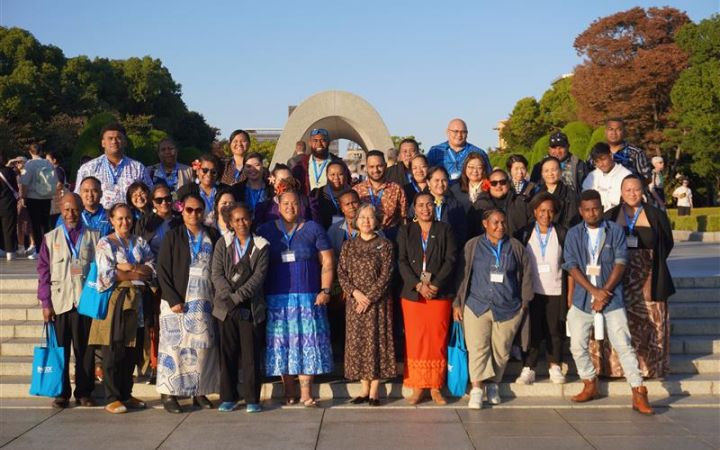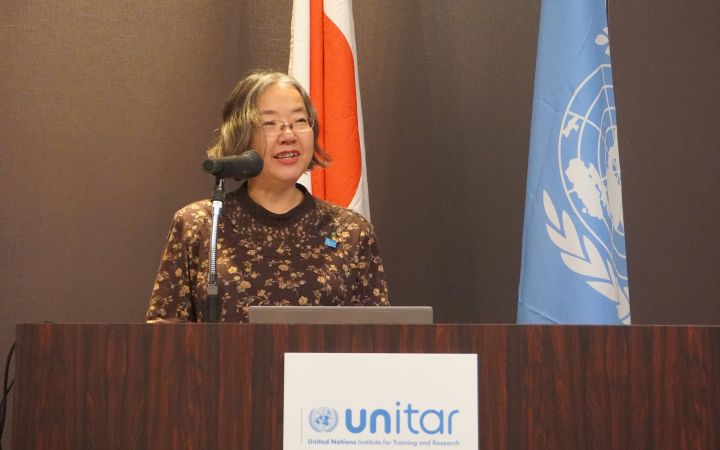- Nearly 30 officials and professionals from 11 Pacific small island countries embarked on a 12-day study tour in Japan as part of the United Nations Institute for Training and Research (UNITAR) "Leave No One Behind: Rapid Response to Climate Crises through Early Warning Systems" training programme.
- The study tour aims to equip the participants with the knowledge and skills to effectively disseminate, monitor, analyse and respond to early warning signals for climate hazards and extreme weather events through expert-led lectures, field visits and group assignments.
- The opening ceremony took place in Hiroshima where Chisa Mikami, the Head of the UNITAR Hiroshima Office, made an official remark and encouraged the participants to immerse themselves in this learning experience and deepen their skills to effectively prepare for and respond to natural hazards.
11 November 2024, Hiroshima, Japan - On 11 November 2024, nearly 30 officials and professionals from 11 Pacific small island countries embarked on a study tour in Japan as part of the United Nations Institute for Training and Research (UNITAR) "Leave No One Behind: Rapid Response to Climate Crises through Early Warning Systems" training programme. Over 12 days, the participants will visit Hiroshima, Kyoto, Kobe, Tokyo, Tsukuba, Kashiwa, and Kasukabe, engaging in expert-led lectures, field visits, and group assignments.
The Japan study tour is the second phase of the UNITAR programme, which aims to equip individuals and communities in Pacific Island countries with the knowledge and skills to effectively disseminate, monitor, analyse and respond to early warning signals for climate hazards and extreme weather events. It is financially supported by the Government and People of Japan.
JAPAN STUDY TOUR ACTIVITIES
In Japan, the participants will explore the challenges and opportunities that arise from climate-related hazards, learn how to promote reliable and timely climate information, and adopt multi-hazard early warning systems in their communities.
Along with the field visits, participants will be coached to develop a group country presentation envisioning adopting early warning systems for disaster risk reduction in their communities and fine-tuning their individual plans. The group presentation is scheduled for the final day. This study tour also provides the participants networking opportunities and establishes a coordination mechanism to increase local resilience across the Pacific.
SCHEDULE
The schedule includes the following (the final programme is subject to change).
Hiroshima
- 11 November: Opening ceremony, introductory lecture on early warning systems, flower offering at Hiroshima Peace Memorial Park
- 12 November: Study visit to Hiroshima City Torrential Rain Disaster Memorial Center and Hiroshima Television Corporation to learn about the media's role in early warning and disaster prevention
- 13 November: Hiroshima City and Hiroshima NPO Center lectures on the mobile application-based local early warning systems and inclusivity in the face of climate crises.
Kyoto/Hyogo
- 14 November: Expert-led lectures on community-based early warning systems, preparedness, and response to protect cultural heritage at the University of Kyoto
- 15 November: Study visits to Kyoto City Office and the Disaster Reduction and Human Renovation Institution
Kanto Region
- 18 November: Expert-led lectures at the University of Tokyo (UTokyo), Kashiwa Campus, and study visits through the Kashiwanoha Smart City Tour and University of Tokyo's Global Hydrological Prediction Center
- 19 November: Study visit to Japan Aerospace Exploration Agency (JAXA) Tsukuba Space Center
- 20 November: Study visit to the Koto Area to learn about countermeasures against flooding and other disasters
- 21 November: Study visits to Japan Meteorological Agency and Kasukabe Underground Flood Protection Tank
- 22 November: Group presentations and closing ceremony at the United Nations University
OPENING CEREMONY IN HIROSHIMA
This phase of the UNITAR programme opened with a ceremony in Hiroshima on 11 November. Chisa Mikami, the Head of the UNITAR Hiroshima Office, expressed appreciation for the participants' dedication to climate resilience and congratulated them for being selected as the top performers from Phase 1. She encouraged the participants to immerse themselves in this learning experience and deepen their skills to detect and mobilize effective responses to safeguard their communities against extreme weather events.
During the opening ceremony, the UNITAR team also conducted an introductory session to provide overviews of the study tour and announced Phase 3 for the top 15 performers from Phase 2 to make a final presentation of their project proposals in Fiji.
ABOUT THE "LEAVE NO ONE BEHIND: RAPID RESPONSE TO CLIMATE CRISES THROUGH EARLY WARNING SYSTEMS" TRAINING PROGRAMME
The UNITAR "Leave No One Behind: Rapid Response to Climate Crises through Early Warning Systems" training programme aims to equip individuals and communities in Pacific Island countries with the knowledge and skills to effectively disseminate, monitor, analyse and respond to early warning signals for climate hazards and extreme weather events. Ultimately, the programme will help save lives and reduce climate-related hazards' negative social and economic impact.
In the first phase of the programme, over 200 officials and professionals from Pacific Island countries embarked on asynchronous online learning and explored risk management, tools, knowledge, and technologies related to early warning systems through a series of expert-led webinars and lessons on online learning platform.
The top performers from the first phase were selected to join the second phase in Japan. From the Japan workshop participants, 15 learners will be invited to the third phase, a 3-day workshop in Fiji, where they will polish their individual project plans and develop their presentation skills.
The programme is part of the UNITAR Shimanami Collective initiative, which comprises a series of training programmes to build resilience against disasters and enhance sea and human security in the Asia-Pacific, with a particular focus on empowering youth and women. Financially supported by the Government and the People of Japan, the Shimanami Collective initiative consists of specialized training in three areas: sea and human security, early warning systems, and women's leadership in disaster risk reduction.
Phase 1 News Article - UNITAR "Leave No One Behind: Rapid Response to Climate Crises through Early Warning Systems" training programme








